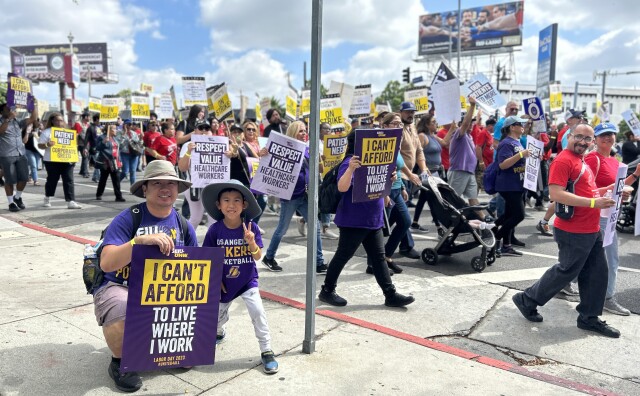Here’s What California’s Abortion Amendment Would Do

California voters will decide in November whether to add the right to abortion and contraception to the state constitution, a move that has taken on greater urgency following the U.S. Supreme Court’s decision overturning Roe v. Wade.
The ballot measure will ask voters to change the California Constitution to declare that “the state shall not deny or interfere with an individual’s reproductive freedom in their most intimate decisions, which includes their fundamental right to choose to have an abortion and their fundamental right to choose or refuse contraceptives.”
That sentence — known as Proposition 1 — is intended to enshrine the right to an abortion in the state constitution.
State law allows abortions before the fetus is viable. After viability, abortions can also happen, but only if a doctor determines a pregnant person’s life or health is in danger.
Experts say the proposed amendment wouldn’t change how the state regulates the medical procedure, nor would it repeal or replace existing law.
-
Introducing a new series: LAist City Treks
-
Why you won't find the best sunscreens here
-
New video shows alleged assault
“The law will remain in place as it has for 20 years,” said UCLA law professor Cary Franklin.
“Doctors will still remain subject to licensing requirements, to medical ethics requirements that they have always been subject to, that govern how they practice medicine.”
Some legal scholars say the language is too broad, potentially opening the amendment up to being struck down by courts in the future. Franklin disagrees.
“Constitutions are written in broad terms, because they are kind of like the skeletal outline of the legal system of the jurisdictions,” she said. “Laws, written by legislatures tend to be more specific, and they point out timelines, and they point out scopes of rights.”
Privacy rights embedded in the state constitution have long been interpreted by courts to protect the right to abortion — but the amendment’s backers say they want to avoid any ambiguity.
The proposed amendment would not broaden the time during pregnancy that Californians could access abortions. (Some states, like Colorado, allow access throughout a pregnancy.) But the amendment would protect against the possibility that a future iteration of the California legislature could pass laws banning or severely restricting abortion.
“This amendment talks of reproductive freedom,” Franklin said. “[If it passes] it will join provisions in the California constitution that protects things like liberty, privacy and equal protection … it is certainly not broader or less explicit than the existing constitutional protections.”
But state laws and state constitutions are subservient to federal laws. And if Congress passed a law prohibiting abortion nationwide, Franklin said, the California Constitution could do nothing to prevent it from taking effect.
“The only way to protect Californians’ rights in the face of a national ban on abortion would be to challenge the constitutionality of the national ban and convince the Supreme Court to invalidate the ban,” she said.
If the proposed amendment passes, California may become the first state in the nation to explicitly protect a right to abortion in its state constitution. Organizers are gathering signatures for a similar ballot initiative in Michigan. Vermonters will vote on a constitutional amendment that would protect the right to “personal reproductive autonomy,” although the text does not include the word “abortion.”
-
A medical industry challenge to a $25 minimum wage ordinance in one Southern California city suggests health workers statewide could face layoffs and reductions in hours and benefits under a state law set to begin phasing in in June. Some experts are skeptical, however, that it will have such effects.
-
Health officials estimate more than 685,000 people in L.A. County have latent tuberculosis, where they aren't sick and are not contagious. One in 10 develop active tuberculosis, with symptoms. Both stages are curable with antibiotics. But it's best to catch it early.
-
The clubhouse model offers a place for people living with mental illness to grow and recover in community. Research has shown they can lead to good outcomes.
-
How some men are taking steps to forge, or rekindle, male friendships to feel less alone.
-
Charlotte Maya's memoir, "Sushi Tuesdays: A Memoir of Love, Loss, and Family Resilience" is an intimate looks at how she continues to navigate her husband's suicide.
-
Fentanyl and other drugs fuel record deaths among people experiencing homelessness in L.A. County. From 2019 to 2021, deaths jumped 70% to more than 2,200 in a single year.









